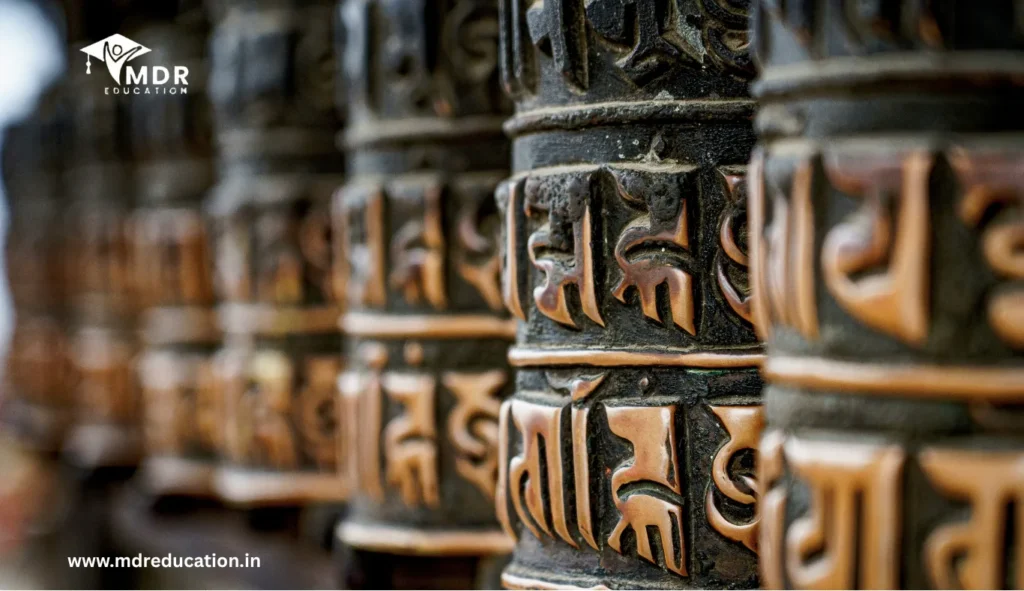Pursue your interest in ancient knowledge by earning a PhD in Sanskrit. Find out how to apply to institutions approved by the UGC, as well as the main advantages of admission.

How to Do a PhD in Sanskrit: 7 Powerful Steps to Get Admitted Fast
MDR Education Consultancy 📍 By phone: 80580 48780 | 🌐 Online at www.mdreducation.in
Do you have a strong interest in classical literature, Vedic scriptures, and ancient Indian knowledge? A doctorate in Sanskrit is your first step if you’ve ever wanted to delve deeply into the language’s history and make scholarly contributions. 2025 is the ideal year to start your doctoral studies, regardless of your interests in India’s rich language legacy—whether you’re a scholar, educator, or fan.
Step 1: Understand the Scope of a PhD in Sanskrit
A PhD in Sanskrit is about discovering a universe of knowledge buried in books, ideologies, and scientific traditions that date back hundreds of years. It’s not simply about grammar and poetry.
Career Benefits of a Sanskrit PhD:
- Become a Research Scholar or Professor at a University
- Work for cultural, heritage, and archeological groups
- Disseminate innovative studies on traditional Indian literature.
- Participate in language policy and preservation
- Participate in global academic partnerships
The need for Sanskrit specialists is growing as a result of the National Education Policy’s (NEP 2020) emphasis on indigenous language research.
Step 2: Check Your Eligibility Before Applying
For Sanskrit PhD applications, the majority of Indian universities adhere to UGC guidelines. Make sure you fulfill these necessary requirements for eligibility:
Minimum Qualifications:
- Bachelor’s degree in Sanskrit or related field (Bachelor’s in Classical Languages, Vedic Studies, or Sanskrit).
- Minimum 55% (or 50% for patients, ST, OBC, and OB).
- Some colleges require NET/JRF qualification or institutional entrance exam.
Before you apply, MDR Education makes sure you meet all qualifying requirements, saving you time and effort.
Step 3: Choose a UGC-Recognized University
Both public and private universities in India offer PhD in Sanskrit programs. Your academic experience, timing, and access to resources will all be impacted by your choice of university.
Top Institutions to Consider:
- Delhi’s Jawaharlal Nehru University (JNU)
- Gujarat’s MK University Patan (MKU)
- New Delhi’s Rashtriya Sanskrit Sansthan
- Sanskrit Evam Vedic Vishwavidyalaya Maharshi Panini
- Numerous private universities connected to MDR Education that have received UGC approval
Based on your location, job schedule, and professional objectives, MDR Education assists you in selecting the best university.
Step 4: Write a Winning Research Proposal
The core component of your PhD application is a research proposal. It must demonstrate the originality of your idea, your study goal, and your familiarity with Sanskrit literature.
Quick Tips to Draft a Strong Proposal:
- Make sure your research topic is specific and well-defined, such as “A Linguistic Analysis of Panini’s Ashtadhyayi.”
- Add the goals, approach, anticipated results, and references.
- Mention any previous publications, work, or interests that are related.
- Make sure it is academically solid and free of plagiarism.
We at MDR Education help you write, edit, and review your proposal till it is perfect and complies with UGC.
Step 5: Prepare for Entrance Exams (If Required)
For PhD admissions, the majority of Indian universities administer an entrance exam. Sections on Indian philosophy, literature, research methodology, and Sanskrit grammar may fall under this category.
Exam Formats May Include:
- MCQs based on Sanskrit themes at the MA level
- subjective inquiries about poetics or grammar (Kavya Shastra)
- Ability to conduct research (based on UGC-NET Paper I)
To increase your chances of success, MDR Education provides entrance coaching and practice exams.
Step 6: Locate a Research Guide Related to Your Subject
The supervisor, or guide, is one of the most crucial aspects of your PhD. They will guide your research, give you their approval, and support you as you overcome academic obstacles.
MDR Education Provides:
- MDR Direct support in selecting a guide from the university of your choice
- assistance with the approval process and guide allocation paperwork
- makes sure your research topic complements the knowledge of your guide. Offers:
We ensure that the absence of guides, a prevalent problem in most universities, won’t cause your PhD to be delayed.
Step 7: Begin Your Journey – From Admission to Degree Completion
Your PhD registration letter will be sent to you after you pass the entrance exam and the interview. The process doesn’t stop there, though; attending progress seminars, preparing your thesis, and managing deadlines are equally important.
Here’s How MDR Education Supports You Till Completion:
- Help with writing a thesis that is unique and free of plagiarism
- Advice on submitting synopses, assignments, and presentations
- Prompt reminders for progress reports and document submissions
- Assistance with degree certification and final Viva-Voce preparation
You don’t only get accepted when you work with MDR Education; you confidently graduate on schedule.
Why Choose MDR Education for Your PhD in Sanskrit?
✅Hundreds of academics in India trust
✅ Completely authentic services with universities accredited by the UGC
✅Clear direction with no additional costs
✅Complete assistance from admission to degree award
✅ Tailored care for academic enthusiasts and working professionals
We are not merely advisors. We accompany you on your walk. — MDR Education Team
Concluding remarks
A PhD in Sanskrit in 2025 is a fantastic way to support India’s intellectual and cultural renaissance. The moment to start is now, regardless of your goals: teaching, research, or using language preservation to change the world.
We at MDR Education share your aspirations and make it our goal. Allow us to assist you at every stage and streamline your PhD acceptance.
📢 Apply today with MDR Education .
📲 Phone/WhatsApp : 80580 48780
🌐 Visit: www.mdreducation.in
💬 Follow us on Facebook: MDR Education Officials
🎓 Limited seats! Don’t forget!
PhD in Sanskrit in 2025
